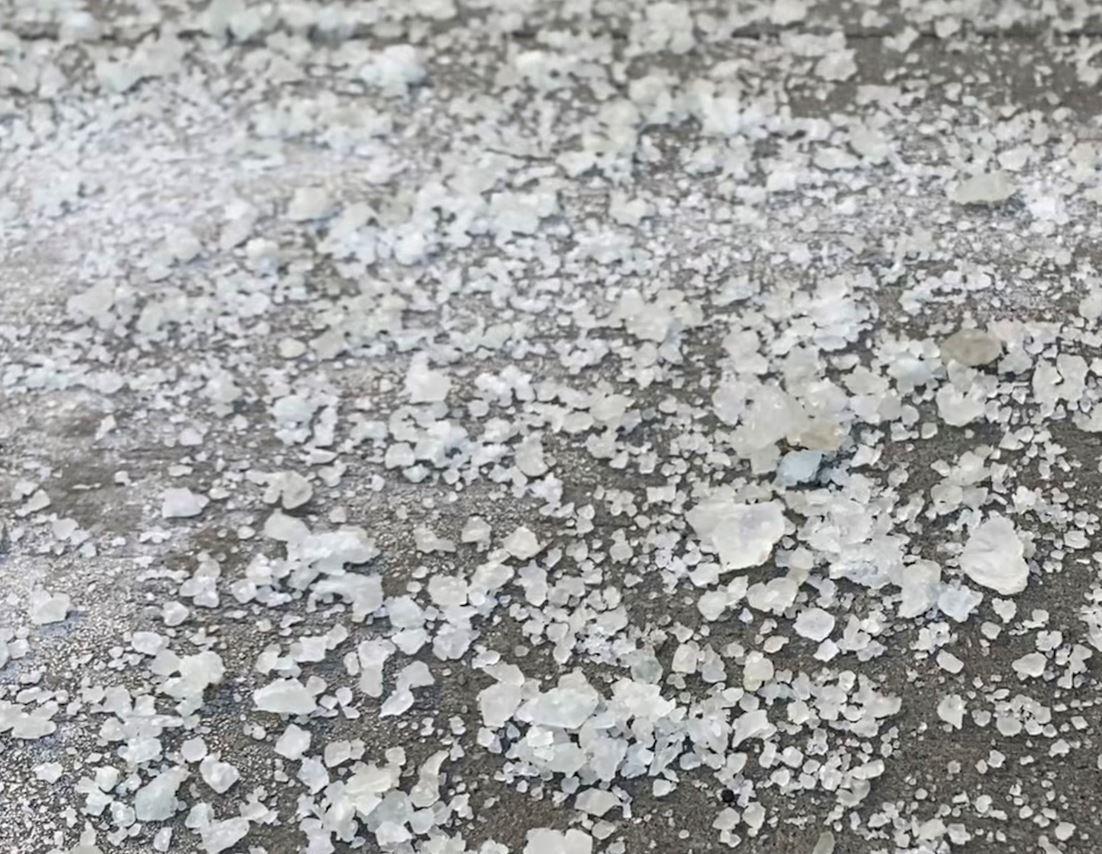Hilary Dugan was walking on Lake Mendota when she saw a plow push snow from the Limnology building’s parking lot into a pile toward Lake Mendota. As a limnologist studying inland aquatic systems and an assistant professor at the University of Wisconsin, Dugan decided to use her equipment to test the salinity of the snow.
Dugan brought a sample of the snow and let it melt overnight before measuring the conductivity of the snowmelt, which is a proxy for salinity. The level of salt in the water was 16 times the current concentration of salt in the lake.
Dugan found that the water salinity was halfway between freshwater and ocean water. While her bucket of snow was collected from right on the lake, Dugan said the rest of the salty snow on UW’s campus ends up draining into the lake every spring. Salt that drains into the lake and the aquifer can harm aquatic life and the quality of Madison’s drinking water.
The salt can also be held in the soil, which often drains to the lake in the following seasons. According to Dugan, salt concentrations in Lake Mendota have been increasing fairly consistently since the mid-20th Century. While salt use in the city hasn’t necessarily increased every year, concentrations in the lake continue to rise due to runoff of salt from previous years.
“This is something that’s happening every winter, it should be a concern,” Dugan said. “It’s a balance between safety, like we like to be able to walk places easily, but also it’s concerning just given our geographical location.”
Salt use is a trade-off between human and environmental safety Dugan said. According to an email statement from UW Building and Grounds Manager Ellen Agnew, for the Division of Facilities Planning and Management, and the university at large, campus safety is the main goal.
Agnew wrote that the university relies on plows, blowers, brooms and shovels as the first method of snow removal. Operators are trained and certified on appropriate salt use and the division calibrates its equipment bi-seasonally or as needed. The university sweeps up extra salt to use for other storms.
The university has several efforts to optimize salt use Office of Sustainability Campus Resource Coordinator Travis Blomberg said in an email statement to The Badger Herald. Aside from working with the Wisconsin Salt Wise coalition, UW is also developing a “Salt Wise at UW-Madison” program based on a blueprint for salt sustainability on campus from the Nelson Institute’s 2018-2020 Water Resource Management graduate student cohort.
According to Blomberg, UW doesn’t currently have a comprehensive salt management plan due to the size and complexity of the university. The Salt Wise at UW-Madison program is underway to create more consistent messaging and salt management plans across campus.
The complexity of systems in charge of road maintenance is a large challenge for reducing salt use, Dugan said. The city, the county, campus, stores and private landowners are all responsible for winter road and sidewalk maintenance.
University collaborates with Racine, Gateway Technical College to study autonomous vehicles
The city of Madison put together the Salt Wise program to reduce salt usage with surrounding cities, but increased salt levels are still an issue for the city, City of Madison Environmental Health Supervisor John Hausbeck said. Salt use impacts the lakes along with drinking water wells, which is something Hausbeck watches as part of the Environmental Health Office.
According to Madison Water Utility, people will be able to taste salt in water from Well 14 on University Ave. within 17 years. Drinking two liters of water from this well equates to the sodium intake from eating one slice of bread.
If no additional salt entered Lake Mendota, salt would eventually flow out, Dugan said. Current salt concentrations are increasing because the level of salt entering the lake is higher than the amount leaving.
Groundwater has a similar flow to surface water, Hausbeck said, but the sodium in this water moves very slowly. Continued salt usage will build up in the aquifer, making it problematic to use as a resource.
UW researchers dive into the power of sea creatures for disease treatment
One solution to slow the amount of salt-related chemicals entering local water sources is to reduce salt use, Hausbeck said.
“Part of the solution may be just becoming accustomed to going more slowly, not demanding completely clear roads throughout the wintertime,” Hausbeck said. “The argument on the other side is, well, slippery roads may mean traffic injuries and death and we don’t want that either. So, it’s definitely a balancing act trying to find the right solution.”
Hausbeck said other efforts to reduce salt use include focusing on different types of de-icers. According to Dugan, road sand is less environmentally damaging than road salt.
While in some parts of the country, sand could cause bodies of water to become cloudy from sediment, Madison’s lakes are naturally sandy. The use of salt is more harmful to the aquatic organisms in Madison’s lakes than sand.
Though sand could cause issues in certain areas of the city such as clogged storm drains, it’s a better road treatment for the environment than salt, Dugan said. According to Dugan, the solution to this problem starts with education.
“I think the easiest solution at the moment is just to be more cognizant of throwing salt down on the environment,” Dugan said. “Every cup of salt we throw on the ground is going to end up in the water.”


















